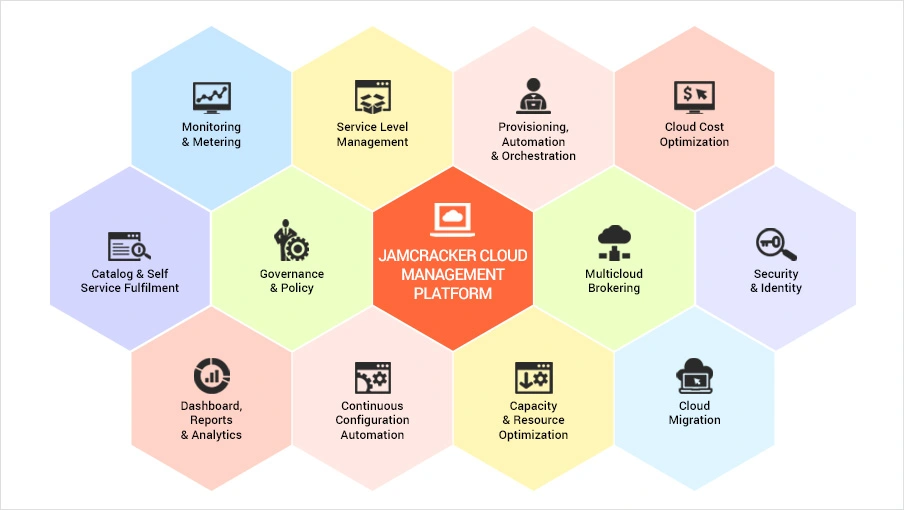What is a Cloud Management Platform and How to Choose the Best?
Cloud computing offers scalability and flexibility, but managing resources across multiple providers can be complex. A Cloud Management Platform (CMP) simplifies this process by providing a centralized interface to monitor, deploy, and optimize cloud resources.
What is a Cloud Management Platform (CMP)?
A Cloud Management Platform (CMP) is a software tool that helps organizations manage cloud infrastructure across multiple providers. It offers a unified dashboard for provisioning, monitoring, and optimizing resources like virtual machines, containers, storage, and networking.
According to Gartner, CMPs enable the management of public, private, and hybrid cloud environments, streamlining cloud operations while ensuring security and cost control.

Why Use a Cloud Management Platform?
Managing multiple cloud services manually can be overwhelming. A CMP helps by offering:
- Simplified Management: Say goodbye to managing each cloud provider individually. A CMP offers a single pane of glass for all your cloud resources, streamlining operations.
- Enhanced Efficiency: Automate tasks like provisioning and scaling resources based on pre-defined policies. This frees up your IT team to focus on more strategic initiatives.
- Boosted Cost Optimization: Gain real-time insights into your cloud spending with granular cost analytics. Identify areas for optimization and eliminate unnecessary resource consumption.
- Improved Security & Governance: Enforce consistent security policies across your hybrid cloud environment and ensure compliance with regulations.
Key Capabilities of a Cloud Management Platform (CMP)
A robust Cloud Management Platform includes:
- Self-Service Portal: Empower users to request and manage cloud resources without IT intervention.
- Service Catalogs: Provide a curated list of pre-approved cloud services for easy deployment.
- Resource Management: Gain complete visibility into your cloud resources, including provisioning, tagging, and de-provisioning capabilities.
- Cloud Orchestration:: Automate complex workflows for resource provisioning, configuration, and deployment.
- Migration Support: Simplify workload migration between private and public cloud environments.
- Financial Management: Track cloud spending, generate cost reports, and identify opportunities for cost savings with real-time insights and predictive analytics.
- Security Features: Ensure robust security with role-based access control, encryption management, and integration with existing security tools.
- Integration Capabilities: Connect your CMP with IT systems, billing tools, and monitoring dashboards for a holistic view of your cloud operations.
- Reporting & Dashboards: Gain valuable insights into resource utilization, performance metrics, and cost trends through interactive dashboards.
How to Choose the Right CMP
When selecting a CMP, consider the following:
- Your Cloud Environment: Consider if you operate in a single cloud, multi-cloud, or hybrid cloud environment. Choose a CMP that supports your specific needs.
- Scalability: Ensure the CMP can scale to accommodate your growing cloud infrastructure.
- Security Features: Prioritize robust security features like role-based access control and encryption to safeguard your data.
- Integration Capabilities: Choose a CMP that integrates seamlessly with your existing IT ecosystem.
- Pricing: Compare pricing models and features to find a solution that fits your budget and requirements.
One such Cloud Management Platform option to consider is Jamcracker. Jamcracker's CMP offers a comprehensive suite of features designed to simplify and optimize your cloud operations. It boasts strong multi-cloud support, robust security features, and seamless integration capabilities, making it a strong contender for businesses seeking a unified cloud management solution.
Frequently Asked Questions (FAQs)
1. What is a Cloud Management Platform (CMP)?
A Cloud Management Platform (CMP) is a software tool that centralizes the management of cloud infrastructure across multiple providers, enabling provisioning, monitoring, and optimization of cloud resources through a unified dashboard.
2. Why do organizations need a CMP?
A CMP simplifies cloud operations by streamlining management, automating tasks, improving cost visibility, enforcing governance, and eliminating the need to manage each cloud service manually.
3. What are the core capabilities of a Cloud Management Platform?
Key capabilities include a self-service portal, service catalogs, resource management, cloud orchestration, workload migration, financial analytics, security, integrations, and reporting dashboards.
4. How does Jamcracker’s CMP enhance cost optimization?
Jamcracker provides real-time cost analytics, usage tracking, and predictive insights that help organizations reduce unnecessary spend and optimize their cloud investments.
5. Can Jamcracker CMP support multi-cloud and hybrid cloud environments?
Yes, Jamcracker’s CMP supports public, private, and hybrid cloud environments, allowing seamless operations across providers like AWS, Azure, GCP, and more.
6. What security features are available in Jamcracker CMP?
Jamcracker CMP offers role-based access control, encryption management, policy enforcement, and integration with enterprise security tools to ensure secure cloud operations.
7. How do I choose the right Cloud Management Platform?
Consider your cloud architecture (single, multi, or hybrid), scalability needs, security requirements, integration compatibility, and pricing model when selecting a CMP.
8. What makes Jamcracker’s Cloud Management Platform stand out?
Jamcracker CMP offers robust multi-cloud support, automated workflows, built-in financial governance, strong security, and seamless integration with existing IT systems—making it ideal for enterprises and service providers alike.